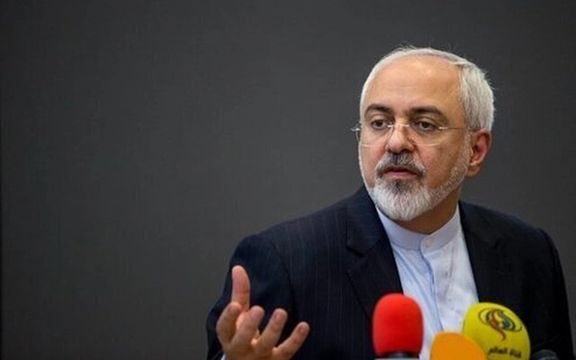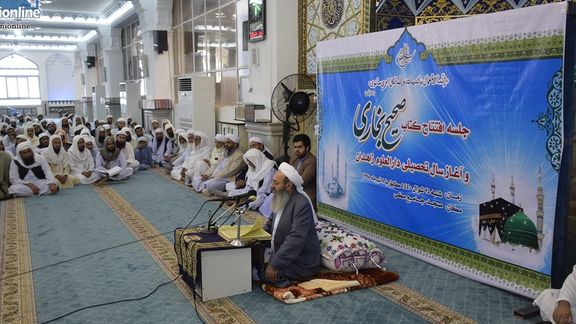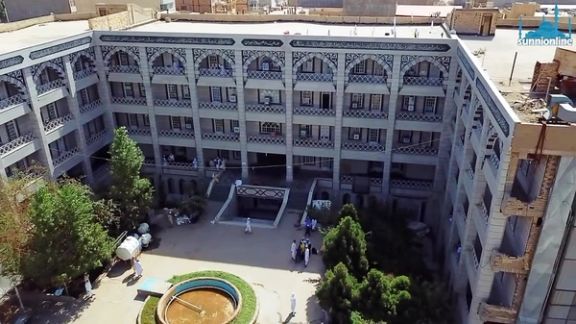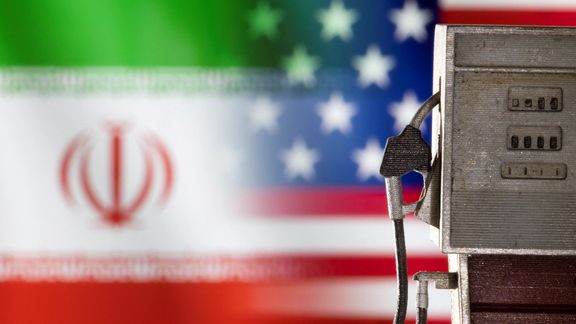US Senator Applauds Passage Of Law To Support Iran Protests

A US senator hailed legislation passed by the Senate Foreign Relations Committee to support action against Iran's killing of protesters and systematic persecution of women.

A US senator hailed legislation passed by the Senate Foreign Relations Committee to support action against Iran's killing of protesters and systematic persecution of women.
Senator Jim Risch (R-Idaho) said Friday that last year's nationwide unrest showed the depth of the people's desire to live free of the “oppressive mullahs”.
“This resolution recognizes their efforts and encourages the administration to do more to end the regime’s systemic persecution of women and state-sponsored murder of Iranian citizens, and to hold human rights violators in Iran accountable. Supporting the aspirations of the Iranian people must be a key pillar of our Iran policy.”
In January, a bipartisan resolution was introduced in the Senate reaffirming US support for Iranian citizens who took to the streets in peaceful protest and condemning Iranian security forces' human rights violations.
“In the wake of the death of Mahsa Amini, the Iranian people have bravely protested the regime’s brutality and demonstrated their desire for a more peaceful and free Iran,” said Risch in January. “The Biden Administration should step up efforts on helping to end the regime’s systematic persecution of women and holding human rights violators in Iran to account.”
In addition to calling on the international community to continue to publicize and condemn the Iranian regime’s crackdown since protests began, the resolution called for the Biden Administration to strengthen international efforts to impose additional sanctions on officials and entities responsible for the violent suppression of demonstrations.
The resolution also emphasized the importance of the US government and the private sector providing additional support for access to digital communications and internet freedom in Iran.

Iran's former Foreign Minister Mohammad Javad Zarif says Tehran has the wrong understanding of its relations with Russia, which is based on miscalculations.
Zarif, who negotiated the 2015 JCPOA nuclear accord with the United States, suggested that Iran should have its strongest ties with China like some 180 other countries in “the current post-western world,” when neither all important events take place in the West, nor it is the West that makes decisions on important developments of the world.
In a speech at the Iranian Society of Political Sciences in Tehran July 12, Zarif said that the end of the Cold War gave rise to the illusion of the emergence of a unipolar world order. "In fact, the years 1990 – 2008 were marked by the illusion of a unipolar world," he said.
The former foreign minister's speech came after a long silence, and it is not clear if the timing of his public appearance carries any particular meaning.
Zarif added that at the time, Russia had lost the Cold War, but the United States did not win it. "We are currently undergoing a period of transition," he said, adding that many politicians in Iran still have the mentality of the Cold War era and expect Russia to play the role it used to play. This is based on a wrong perception and this miscalculation can lead to our destruction.
"Today Russia cannot compete with other powers in any area. The reason why Russia attacked Ukraine was that it wanted other powers to negotiate with it," Zarif said, adding that "Today there is no permanent alliances between countries. Instead, they are replaced with temporary coalitions. Thinking of permanent alliances is a pitfall."

He argued that Iran wrongly thinks Russia can be its ally. Many were surprised when Russia did not veto UN Resolution 1929 against Iran, which set up a fact-finding mission to investigate human rights violations. “But I knew that they were not going to veto it,” Zarif said. However, he insisted: “I am not an anti-Russian person. I believe it is dangerous for Iran to be anti-Russian or anti-US. We should prioritize our national interests and then consider opposing US domination."
Zarif argued that perhaps no new dominating power will emerge. China's point of strength is the power of its trade and technology. He added that we are moving toward a global network rather than a bipolar or unipolar world.
Speaking about the nuclear talks, Zarif said the negotiation has always been a war of narratives between Iran and the United States which did not work well although both Iran and the US narratives were meant to reach an agreement.
Meanwhile, former diplomat Jalal Sadatian also said in an interview on Saturday that "China and Russia simply perceive Iran as a friend and not as a strategic ally and regulate their ties with Tehran based on the same perception."
He observed that Iran unilaterally assumes that countries such as China and Russia are its strategic allies, but those countries do not have such a definition of their ties with Iran.
Sadatian, a former Iranian ambassador in the United Kingdom, said, "This explains why Russia and China sometimes take positions against Iran's territorial integrity. They regulate their relations with Iran based on their own national interests not based on illusions. Therefore, when they see relations with the Persian Gulf Arab states is more beneficial for their interests, they align with those countries rhetoric."
"This means, when they see they can win hefty contracts with Saudi Arabia and the United Arab Emirates they tend to get closer to those countries regardless of our demands and interests," Sadatian explained.
Earlier in the week, in a joint Russia-GCC statement at the sixth joint ministerial meeting between the Persian Gulf Cooperation Council and the Russia, ministers affirmed their support for the United Arab Emirates demand over three Iranian islands.
He added that the third point in this respect is that "the Islamic Republic needs to strike a balance in its ties with East and West in order to benefit from its geopolitical potentials. Iran's constant anti-Western rhetoric will eventually weaken it."

The office of top Sunni cleric Mowlavi Abdolhamid has refuted government allegations that many of the students and teachers of his seminary are in Iran illegally.
“The state media claims that some of the teachers and students of Zahedan Dar ol-Olum [also known as Maki Seminary] have forged their identity documents is absolutely false,” Abdolhamid’s office said in a statement published on his official website Thursday, following a recent mass expulsion.
The state-run television (IRIB) reported Wednesday that authorities arrested 132 preachers who were “foreign nationals” and aired brief interviews with three Afghan men, presumably from among the preachers sent back home, who said they had forged identity documents and entered Iran illegally.
The statement from the Sunni cleric came a day after the Revolutionary Guards (IRGC) linked Tasnim news agency claimed that fifty percent of the students and some of the teachers of Maki Seminary are “foreign nationals” who are illegally residing in the southeastern Sistan and Baluchestan Province.

The expulsion of seminary students was part of government pressure tactics against Abdolhamid who has been a consistent critic of the Shiite clerical regime since 90 protesters were gunned down by security forces in Zahedan on September 30, 2022.
Abdolhamid’s office said the Afghans sent back to Afghanistan were forced to make false statements about forging identity documents and illegal residence in Iran, threatening to reveal details of security forces’ intimidation.
In an attempt to conceal the mass expulsion, Tasnim claimed that a considerable number of seminary teachers and directors with illegal identity documents and forged identities were spared harsh prison sentences and instead sent back to their home country, attributing the reprieve to “Islamic compassion”.
The outspoken, moderate cleric who has become the unofficial voice of the country’s Sunni population - which is roughly 10 percent of the 88 million population - has come under constant pressure from the authorities recently to stop his fiery Friday sermons.

Abdolhamid has criticized the government for funding and controlling religious seminaries and taking away their independence. Iran's government annually allocates hundreds of millions of dollars to Shia religious seminaries and other religious institutions that play the role of its propaganda arm.
Abdolhamid’s call for a referendum with the presence of international observers to decide the future form of government in Iran has massively angered hardliners. He has expressed more liberal views about the role of women in the society after being criticized by some Baluchi activists for not mentioning women and acknowledging equality of men and women in his controversial Friday prayer sermons.
Iranian authorities often refer to citizens of Afghanistan, millions of whom live in Iran as refugees or economic migrants, as “foreign nationals”.
In April 2022, Foreign Minister Hossein Amir-Abdollahian said one million more Afghans had entered Iran since the Taliban took power in August the previous year, bringing the number of refugees and economic migrant to five million.
According to the UN Refugee Agency (UNHCR), only 780,000 of Afghans residing in Iran are recognized as refugees. Most other Afghans are considered economic migrants who have been an important workforce in Iran.

One hundred political, Iranian Kurdish civil and human rights activists demanded accountability from the regime regarding the killing of Kurdish political prisoners.
In a statement on Friday, the signatories slammed the "arbitrary arrests" and deaths of Kurdish political prisoners, expressing serious concern over the practice.
The judicial authorities and related security institutions are responsible for saving the lives of political prisoners and any delay and failure to address the issue will heighten the public sensitivity in this regard, the group stated.
In recent days, the bodies of at least two Kurdish political prisoners, Peyman Galwani, 24, from Mahabad, and Mousa Esmaili, 35, from a village in Piranshahr in Iran’s West Azarbaijan province, have been handed over to their families by the security agencies.

Kurdish human rights organizations reported that both of them were tortured to death in detention.
Galwani’s family was informed that he had "fallen from a height" leading to his comatose state, the cause of death given for innumerable opposition activists, which many believe were in fact murdered by state agents.
He was violently arrested by the security forces at his family home in Mahabad on June 25.
Esmaili was arrested on May 7 while agents confiscated his car. According to Hengaw, a source close to Ismaili's family said, "without any explanation or providing evidence of any judicial process and trial the security officers only said that Mousa was executed.”
Iranian intelligence and security agencies often bring unsubstantiated charges against dissidents, who are then tried behind closed doors without a lawyer. Several have died in unclear circumstances and torture.

A barter of Iranian natural gas for Iraqi oil as described by the Iraqi prime minister this week would likely violate US sanctions on Tehran.
The only path for a clean deal would be for the US to issue a waiver permitting it, three former US officials have told Reuters.
Iraqi Prime Minister Mohammed Shia al-Sudani on Tuesday said Iraq would begin trading crude oil for Iranian gas to end recurring payment delays to Tehran due to required US approval for such transactions.
Sudani said Iran had cut gas exports to Iraq by more than half as of July 1 after Baghdad failed to secure US approval to disburse owed funds, but Tehran had now agreed to resume gas exports in exchange for crude oil.
There are few details available about the potential barter, which could help defuse a political problem for Sudani since power cuts are unpopular during the sweltering Iraqi summer when temperatures can top 50 Celsius (122 Fahrenheit).

However, three former US officials said a barter would likely run afoul of US sanctions.
"It would be a violation of US sanctions to conduct this kind of a barter transaction with Iran absent a US national security waiver being issued," said Richard Goldberg of the Foundation for Defense of Democracies think tank.
"This would be prohibited under the Iran Freedom and Counter-Proliferation Act, which prohibits any transaction related to energy with Iran," added Goldberg, who served on the Trump administration national security council staff.
Secretary of State Antony Blinken issued a 120-day waiver on March 21, a State Department official said, allowing Iraq to pay Iran only for electricity imports, not for natural gas to fuel Iraqi domestic power generation.
"The March 2023 waiver, granted by the Secretary, allows Iraq to purchase electricity from Iran. Nothing else," said the official on condition of anonymity. That waiver was announced by the State Department on March 31.
There has been speculation the waiver might be amended to allow barter, an issue the official declined to address.
"We are not in a position to preview any future decisions related to the waiver. We have no comment at this time regarding reports of a barter arrangement between Iraq and Iran," the official said.
The Iraqi embassy in Washington did not immediately respond to a request for comment.
Former US officials said the Treasury Department, which oversees most US sanctions against Iran, defines the term "transaction" so broadly that it would cover a barter exchange.
"The test is whether it's a 'significant' transaction. The test is not whether it's denominated in one currency or another or whether ... it's a barter," said a former senior Treasury official on condition of anonymity.
The former official said that could provide "enough wiggle room ... for the US to look the other way, but that is a political decision, that's not a legal question.
"As far as a strictly legal question, it absolutely does violate US sanctions," he added.ew Miller, the spokesperson for the US State Department, calling it "a leave of absence”, adding that his duties would be temporarily assumed by his deputy, Abram Paley. However, it is believed he had been suspended as early as April.
Capitol Hill Republicans are growing increasingly frustrated with the Biden administration’s unwillingness to share information about the issue. Adding salt to the injury, an article by Tehran Times, a publication controlled by the Iranian regime, provided astonishing details about Malley's situation. This has led to concerns that the Iranian government knows more about the issue than US lawmakers.
(This report was published by Reuters under the name of Arshad Mohammed)

The US House of Representatives foreign affairs committee has issued an ultimatum to the State Department to come clean about the suspension of its Iran envoy Rob Malley.
The chairman of the committee Michael McCaul (R-TX) wrote his second letter to Secretary of State Antony Blinken – as he had vowed to do if he did not get answers – on Thursday with stronger words and a call to immediate action: a classified briefing and testimony.
McCaul referred to his earlier letter of June 30 to Blinken seeking "a full and transparent accounting" about why Malley was suspended and was under investigation. The Senior Republican lawmaker slammed the response he received this week as "absolutely unacceptable" because the department refrained from providing any information.
In the new letter, McCaul asserted that “the Committee expects prompt and full compliance with its requests, and it will not tolerate obstruction of its oversight of this national security matter.”
As an initial next step, he asked Blinken to make arrangements “no later than 5:00 pm Monday, July 17 for a classified briefing on or before Wednesday, July 26,” threatening that “If you fail to make such arrangements in a timely manner, I am prepared to request testimony on this matter in a classified hearing and to compel the appearance of requested witnesses should they refuse to appear voluntarily.”
To ensure compliance by the State Department, he referred to the US Constitution, saying, "The Department of State shall keep the Committee on Foreign Relations of the Senate and the Committee on Foreign Affairs of the House of Representatives fully and currently informed with respect to all activities and responsibilities within the jurisdiction of these committees.”
“Any Federal department, agency, or independent establishment shall furnish any information requested by either such committee relating to any such activity or responsibility," he added.
Earlier on Thursday, a group of 18 Republican senators called for a probe into the murky circumstances surrounding the State Department’s handling of Malley’s security clearance investigation.
Spearheaded by Senator Bill Hagerty (R-TN), the group sent a letter to Diana Shaw, the acting inspector general of the Department of State, outlining specific questions that must be answered “no later than Friday, July 21, 2023.”
Congress was kept in the dark about Malley having been suspended at least since early May and was only informed about it when his replacement was announced. Malley’s suspension was first reported by Iran International June 29, and formally announced the following day by Matthew Miller, the spokesperson for the US State Department, calling it "a leave of absence”, adding that his duties would be temporarily assumed by his deputy, Abram Paley. However, it is believed he had been suspended as early as April.
Capitol Hill Republicans are growing increasingly frustrated with the Biden administration’s unwillingness to share information about the issue. Adding insult to injury, an article by Tehran Times, a publication controlled by the Iranian regime, provided astonishing details about Malley's situation. This has led to concerns that the Iranian government knows more about the issue than US lawmakers.